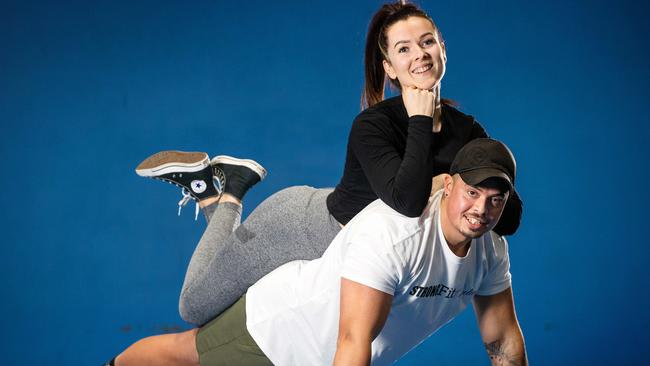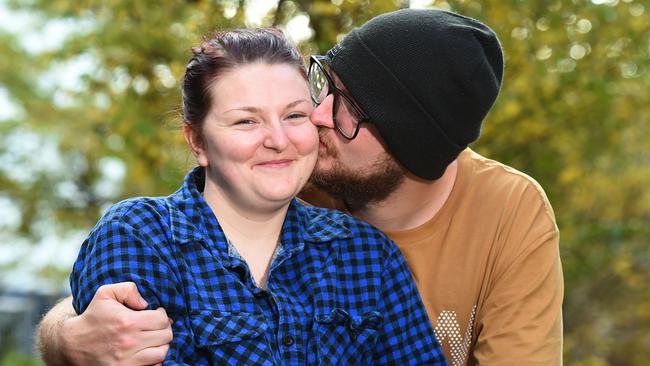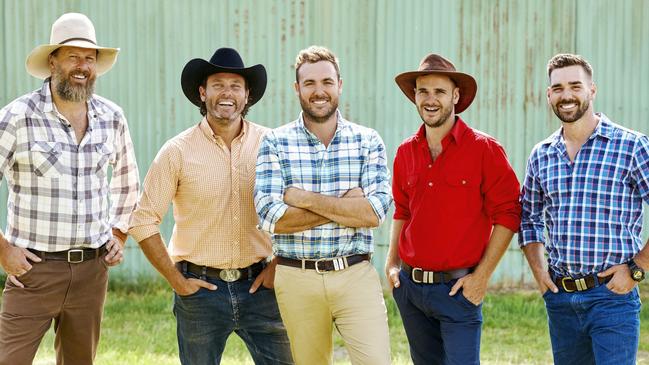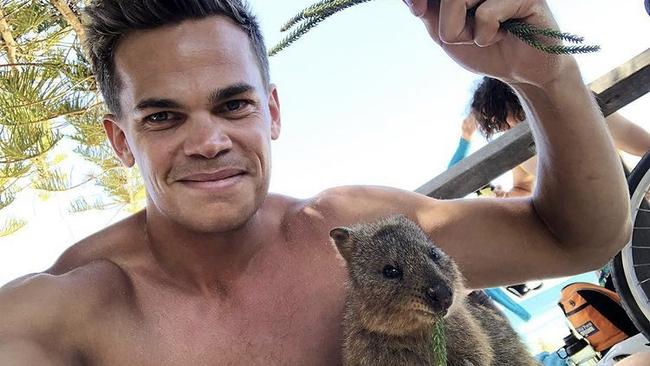Whether on Tinder or at the gym, Melbourne singles are hooking up after Covid lockdown
Looking for love? Here are the towns where there are most single men to women and most women to men. But if moving fails, try heading to the gym to find your mate.
Victoria
Don't miss out on the headlines from Victoria. Followed categories will be added to My News.
Towns where there are more men than women
Mount Cottrell – 144.6 men per 100 women
Rosedale – 144.1 men per 100 women
Beaufort – 126.5 men per 100 women
Ararat – 118.2 men per 100 women
Towns where there are more women than men
Mornington – 88.2 men per 100 women
Armadale – 88.2 men per 100 women
Northcote – 88.3 men per 100 women
South Yarra – 88.3 men per 100 women
Carlton – 88.4 men per 100 women
Source: Australian Bureau of Statistics 2020
Love among the gym racks
Personal trainer MJ Niklaus, 30, spotted his perfect match, Melissa Snelson, at Powerhouse Gym in Sunbury about three years ago and the pair have been madly in love ever since.
Mr Niklaus said he was “lucky” the couple’s paths crossed in their late 20s at the gym after both having ended long term relationships about a year before they met.
Ms Snelson said she “played it cool” when she first met Mr Niklaus when she joined the gym.
“It started off as I just like little hellos and little glances at each other but you could just sort of tell that something was going on,” she said.
Mr Niklaus said: “From there, we caught up for a free coffee and that was it.”
Fitness has remained a cornerstone of their relationship, with gym hopping even becoming a regular Saturday morning staple for the gym junkies.
“We used to try out all the gyms across Melbourne, we’ve probably pretty much covered all of them,” Mr Niklaus said.
“We do that regularly on the weekends.”

TINDER SPARKS IN MELBOURNE
Far from preventing singles hooking up, Covid bans have fuelled the search for love and lust in Melbourne, with the country’s most locked-down city now the world’s second busiest on Tinder.
After Los Angeles, Melburnians are the most sought after in the world on the online popular dating platform.
Melburnians appear desperate to make up for time lost looking for love during lockdowns, with Victorian chief health officer Brett Sutton’s bonk ban now a thing of the past.
Figures show that between April 1 2020 and 31 March this year, Melbourne became one of the most in-demand locations on the planet for users wanting to talk to potential matches outside of their home towns, second only to LA.
Melbourne beat out every other Australian capital city for international romantics hoping to swipe right and was also the most popular city for other Aussies looking for interstate romance.

SCREEN TIME THE WAY TO SAY ‘I DO’ TO THE LONG HAUL, OR FOR THE NIGHT
Senior sociology lecturer at Monash University Dr Brady Robards said dating apps had become the most common way for people to connect with others for romance and sex, after single Melburnians last year took “liberties” with the term ‘intimate partner’ to justify hook-ups and casual dates
“In Australia, Melbourne has of course experienced the most intense and prolonged forms of lockdown and physical isolation, so that’s not surprising that people are turning to apps like Tinder here,” Dr Robards said.
Relationship counsellor Helen Telfer said apps such as eHarmony and Bumble also remained popular choices for hopeful romantics.
“Meeting online can help individuals to get to know each other without other distractions or stressors because we benefit from quality time that is uninterrupted and ongoing,” Ms Telfer said.
“We can benefit from interacting at a distance and not getting caught up in chemistry.
“This can happen later when a couple is ready to take their relationship offline.”
Chloe Davison, 23, met her partner, Josh Maynard, on Tinder at the height of Victoria’s second Covid wave last year.
Ms Davison said she can no longer imagine her life without Josh.
“He is my rock. I don’t know what I’d do without him,” she said.
“My partner and I met on tinder. We live together and it has almost been a year.
“The first time we met, I was new to the area and he picked me up at my house and we drove around for a few hours and he showed me around town.
“We parked somewhere and we talked and that’s also where we shared our first kiss.”
Tinder’s research revealed the most popular pastimes for its users included camping, exploring the outdoors, getting a drink, keeping active and watching movies.
Dr Robards said apps such as Tinder helped people connect over these shared interests even when the pandemic halted real-life encounters at bars, restaurants or workplaces.
“Those other in-person, physical-space chances to meet and connect are much more complicated during a pandemic and associated lockdowns, so meeting online is even more important,” he said.

APPS A BOON FOR BONK-LESS REGIONAL BLOKES
Ms Telfer said discovering common interests online also broke the distance barrier for Victorians living in regional or rural areas.
While the threat of encountering ‘catfish’ accounts remained a concern for some online romantics, dating-to-marry apps such as Soulmate have developed facial recognition technology to deter potential scammers from thwarting legitimate connections.
Co-founder of The Demographics Group, Simon Kuestenmacher, said dating apps such as Tinder and Bumble were particularly useful for men living in regional areas.
“It’s slim pickings for them, so these apps broaden their dating pool” he said.
“Regional people on those apps would consider travelling further for a partner whereas in Melbourne people would be hard pressed to cross the river for a day. There’s a reason why Farmer Wants A Wife is a big show.”
Mr Kuestenmacher’s insights mirror this year’s Farmer wants a Wife cast, featuring five male farmers looking for love.
It comes as Brooke Blurton is set to look for love as Australia’s first indigenous and bisexual woman to be Bachelorette, while commercial pilot Jimmy Nicholson gears up to find his match on this year’s Bachelor.

“It is a wonderful way for people to connect when they would not have crossed paths in real life. There are a lot of barriers,” Ms Telfer said.
“Not having to negotiate noise, crowds or choosing somewhere to meet relieves our interaction from many other stressors, too.”
– With Miles Proust




